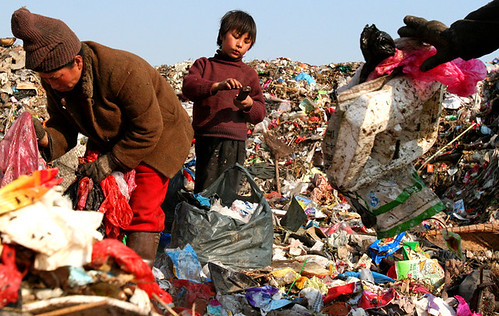
... ... The most crucial task for government to do is to explore the ultimate reasons for various phenomena and then fix the fundamental problems rather than treating symptom but not the disease. Government report spent a lot of space to talk about “Problems of Peasant, Village and Agriculture” . It also talked much about how government should help the disadvantaged groups. But the origin of these problems is the excessive power of government and insufficient civil rights. The disadvantaged people's power is the least. So the most important job is to strengthen civil rights and change the power structure rather than to improve people's livelihood. As
Amartya Sen said, granting more freedom to people implies better development. It is not necessary to implement “secondary distribution” for actualizing so-called "equality of distribution".
From this perspective, I appreciate very much the report's evaluations such as “There are some weakness and insufficiency of government works” and “There are problems of government's building”. They are so rare and honest compared to the previous government reports. I particularly admire that the report mentioned that “develop democracy and strengthen legal system. This is the demands coming out of socialist system. To build a harmonious society, the most important is to strengthen democracy and legal system, and promote social justice.” This notion accurately captures the core problem of all facing contemporary China. China's problem lies on the fact that political reform lags behind economic institutional reform. This dis-equilibrium is the original problem leading to a lot of imbalances.
For example, why are there disequilibriums of consumption, investment and foreign trade in China? On the surface, it seems to be a macro-economic problem. However, there are political factors.
The Government Work Report (2006) mentioned that during “The Tenth Five-year Plan”,
GDP increased by 57.3%, city resident's average income increased by 58.3%, rural villager's net income increased by 29.2% and government revenue skyrocketed by 1.36 times. Obviously, government revenue growth is much higher than GDP growth and resident's growth. The increase in people's income also lags far behind GDP growth and government's financial income growth (
This year's report further admitted this over-growth of financial revenue). Obviously, because of excessive growth of government's power and “coercive revenue”, distribution of national wealth is unequal. The insufficiency of residents' consumption leads to weak domestic demand. That is why Chinese enterprises resort to foreign trade to look for a better market.
The ordinary people could not afford medical fees, school fees, and high price of apartment. People put the blame on market failure. The reality is that government's supply of housing, education and medical services (market oriented and public) is not enough. What lies behind is the insufficiency of public pressure on government power. The underdevelopment of civil rights leads to insufficient supply of public good and services.
Among the disadvantaged group, peasant is the poorest because they are far away from power centre. If peasant has the same power as urban resident, would the “Problems of Peasant, Village and Agriculture” be so serious? Therefore, if you say peasant is too poor, I would say that peasant is lacking power. If you suggest reduction of tax for peasant, I suggest grant more power of self-government to peasant.
Unequal distribution of power leads to the “zero-sum game” in which the gain of some people results in some people's loss. This causes social disharmony. Recently, the Special Topic Team of Public Policy Research Centre,
Chinese Association of Economic Institutional Reform, calculated the price difference between the two systems (market and non-market). The results show that there is no difference between the present and the past. In 2004, considering the effect of public power, the price difference is as high as 4.7 billion yuan, about 1.5 times the annual revenue. The land price difference is 528.5 billion yuan. The monopoly rent sought by monopoly industry is 212.5 billion yuan. The loss of national asset is 71.549 billion yuan. The rent caused by corruption is 20 billion yuan.
According to this estimation, the total of rent caused by government monopoly and corruption reaches 832.549 billion yuan, about 5.2% of GDP and 55.1% of the annual revenue of the central government. Without the disgusting new system of two prices, China’s gini coefficient is 0.3797 in 2004. Because of corruption and restriction, China’s gini coefficient is going up to 0.465, the warning line of wealth gap according to international standard. Although China’s marketization seems to be speeding up, the space for rent seeking caused by government power is becoming bigger and bigger. All these show that the fundamental of all disequilibrium is power inequality. Without political reform, reform itself is skewed. The steps of economic and political reforms are incoherent. The combination of marketization and traditional political institution fail to enable China to march forward in a health way.
... ...
Excerpt from source: 趙曉<
失衡的中國>
Photo:
sheilaz413Labels: China, economy, politics, poverty








